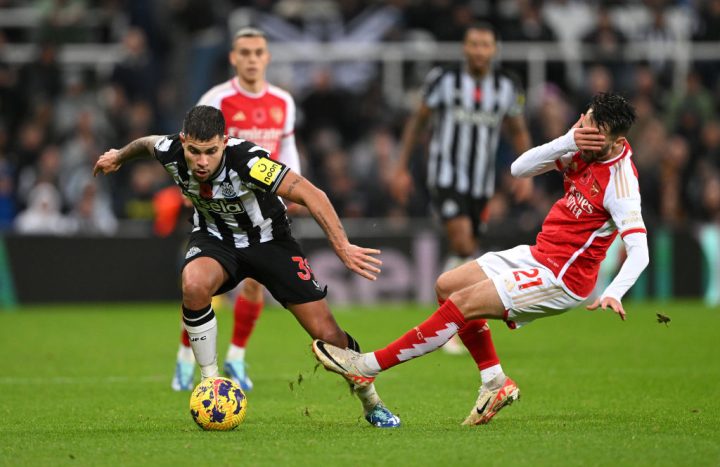Here we go again. Just when you thought a period of welcome stasis might have descended on the world of football rules and regulations, we look set for yet more flux. On Tuesday, the International Football Association Board (IFAB) agreed to test a raft of new measures in the game. These include sin bins – a potential 10-minute detention for bad behaviour – and a new rule stipulating that only the captain is allowed to remonstrate with the referee. Trials could be held (including in the Premier League) as early as next season.
IFAB has identified unsportsmanlike behaviour by players, including dissent, as ‘the cancer that [might] kill football’. They are particularly concerned about the ‘professional foul’: that little trip, shirt pull or shove that puts an attacker off just as a decent chance to take the ball looks likely to present itself, but which is lightly punished as it doesn’t meet the criteria for a red card.
Is player misbehavior really a ‘cancer that might kill the game’?
Every football fan is likely to have a few ‘professional fouls’ that cruelly disadvantaged their team burned into their memory. For those with long memories it is Arsenal’s ‘clodhopping’ defender Willie Young’s cynical hack on West Ham’s 17-year-old Paul Allen in the 1980 FA cup final that will forever be the classic example of the genre. Young got a yellow card. Allen picked up his medal in tears.
Young’s villainy led to a change in the rules (players could be sent off for preventing an obvious goal scoring opportunity) but the problem hardly went away. A fresher example, and one apparently cited at Tuesday’s meeting, is Giorgio Chiellini’s shirt pull on Bukayo Saka in the 2020 Euro championship final. The move prevented the Arsenal player from advancing on goal, but only earned Chiellini a yellow. Under the new rules the Italian could be heading for 10 minutes on the bench.
FA chief executive and IFAB member Mark Bullingham has stated that sin bins have worked well in grass roots football so there is some hope that the elite game could be improved too. And the system seems to work in rugby, as does the rule of only the captain speaking to the referee.
But the timing is a little odd. Is player misbehavior really a ‘cancer that might kill the game’? Football will forever be ‘a gentleman’s game played by ruffians’ but I can certainly remember worse days than these. Do we need more tinkering?
Currently, yellow cards can be given in the Premier League if more than one player approaches the referee, and a red can be applied for a foul on a player heading clear through on goal. ‘Simulation’, or ‘diving’ for those of a certain vintage, has already been clamped down upon to some extent and is rarer than it was.
Arguably, a more pressing issue now is the off-field behaviour of managers, a few of whom have looked positively feral at times this season. Jurgen Klopp’s emotional style has helped make him a hero at Anfield but he surely went too far in calling for a replay after his side controversially lost to Spurs. Arsenal manager Mikel Arteta’s rant over Newcastle’s winner also went way over the top.
Could it be that the authorities are involved in a bit of displacement activity here? The real bone of contention with fans and managers is the usefulness or otherwise of VAR. It was this issue that sent Klopp and Arteta wild and which raised its ugly head yet again this week with Tuesday night’s highly dubious 98th minute penalty for Paris Saint Germain against Newcastle in Paris.
Though it will be tweaked, the technology looks here to stay (IFAB agreed to discuss whether VAR should be expanded to cover free kicks, corner kicks and second yellow cards). Dismantling it would be difficult, expensive and embarrassing and (I would, just about, still argue) wrong. So, to placate the excitable fans and managers it makes sense to do everything else that can be done, outside of VAR, to improve fairness and integrity. And to be seen to be doing so.
This doesn’t mean the new measures won’t work. They may do, only time will tell. Or rather, as with VAR, time probably won’t tell. The success of sin bins will likely not be determined by a scientific analysis of whether they have, over a decent stretch of time, improved the fairness of the game, but on an emotional reaction to a few high profile instances when they clearly didn’t. A player unjustly binned watches on as his side concedes a crucial goal in a vital match. The fans and manager howl in outrage ‘put sin bins in the bin’, conveniently forgetting all the occasions when it did work and their team benefitted.
But such is football. Despite the best efforts of the administrators and the technicians, it remains essentially incorrigible, ungovernable, and unjust. Perhaps, for many fans, that’s the way they prefer it.







Comments